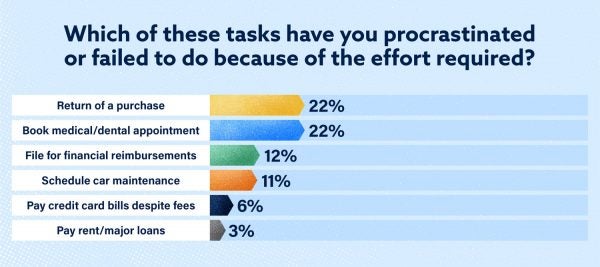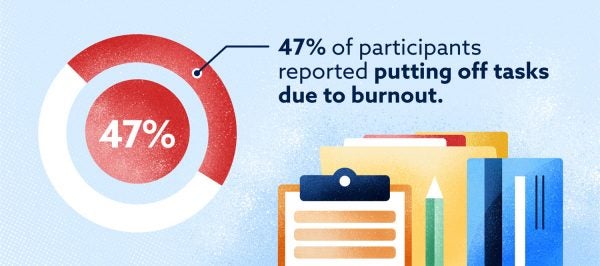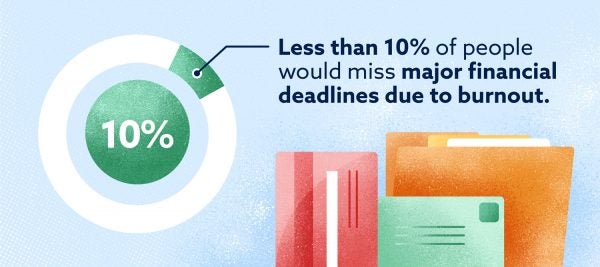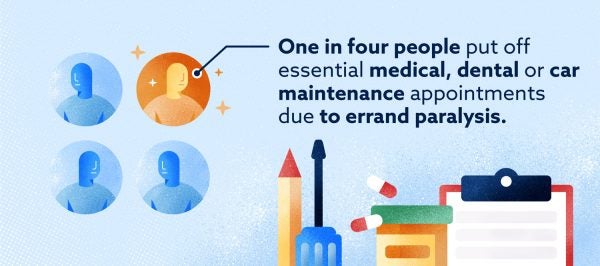
47% of participants reported putting off tasks due to burnout.
Recent conversations about “millennial burnout” — exhaustion due to constant pressure to be working, even outside of one’s job — has given rise to a new term: errand paralysis. Millennials often report a seeming inability to complete simple tasks, like successfully doing laundry or registering to vote, which has led to characterizations of the demographic as lazy and entitled. But a new theory suggests the reason for errand paralysis isn’t a lack of motivation — they’re just too burned out.
Many of these errands, which are pushed aside because they seem unimportant, have a financial cost associated with them — one respondent’s partner reported being so overwhelmed by the prospect of filing insurance paperwork that he missed a deadline and sacrificed over $1,000.
In order to learn what the real cost of burnout and the subsequent errand paralysis is, we surveyed over 1000 people to learn what types of tasks they most frequently neglect because they’re just too burned out.

Here are some key takeaways:
- Almost half of the survey participants reported procrastinating or neglecting tasks due to feeling burned out.
- One in four people reported putting off essential appointments, like doctor’s visits or routine car maintenance.
- Less than 10% said they would miss major financial deadlines like making rent, loan or credit card payments.
Who Experiences Burnout?

Our survey included people of all ages, and just under half reported having felt too burnt out by daily life to complete basic tasks. So while errand paralysis has been largely characterized as a millennial trait, the data suggests that burnout may be on the rise across generations.
Burnout is defined as a “response to prolonged stress” and is common in environments like new parent households or difficult workplaces — any situation in which people “have to navigate complex, contradictory and sometimes hostile environments.” Psychologists believe that higher rates of burnout among millennials may be a result of generational differences in response to emotional exhaustion, but many other possible factors, like rising economic stress and increasingly invasive technology, also impact other generations to varying degrees.
Responses were about the same across genders, indicating that burnout — or at least the errand paralysis that results from it — impacts men and women equally.
When Burnout Hits, Financial Tasks Take Priority
Errand paralysis may be common, but the types of chores we put off vary. We wanted to find out how much burnout costs — are people just putting off small tasks or is burnout powerful enough to have a major impact on our lives and finances?
Our survey gave respondents the option to select from a list of errands that ranged in urgency and potential cost. We found that people were most likely to put off chores with smaller costs associated, like returning a purchase (17.4%), than something with a higher potential consequence, like paying rent (2.4%). In fact, fewer than 10% reported that they would allow burnout to interfere with major deadlines like rent, loans or credit card payments.

Research has shown that when money is attached to a goal, people are almost five times more likely to complete it, so it makes sense that the tasks with the highest financial consequences are those that are rarely procrastinated. However, humans are subject to a cognitive bias called the denomination effect, which means we’re less likely to spend on one large-ticket item than we are on several smaller ones — even if the smaller purchases add up to as much or more than the big one.
In other words, even though errand paralysis might not impact people’s larger financial habits, the effect it has on our perceived smaller behaviors, repeated over time, can add up to the exact same amount of waste.
Essentials Like Medical and Car Maintenance Are Overlooked
Two of the survey answers — putting off medical/dental appointments and putting off routine car maintenance — represented not current cost, but the risk of higher costs down the line. For instance, a routine oil change costs about $25, so neglecting to get one may seem like a money-saver in the moment. But putting off an oil change for too long could potentially cost thousands when you ultimately have to replace your entire engine. The same goes for neglecting medical checkups, which could result in major health costs later on.
Interestingly, nearly a quarter of respondents said that they put off essential appointments like medical visits and routine car maintenance — significantly more than those who put off less important tasks like making returns (17.4%) or filing for a reimbursement (9.1%).

This willingness to skip a small, immediate cost and run the risk of a larger one down the line can be explained by what psychologists call zero risk bias, which is the human tendency to choose to completely eliminate a small risk instead of substantially reducing a much larger one. Our survey shows people are more likely to avoid small, immediate costs like copays and maintenance and run the risk of a major expense later on than to pay the fee up front and substantially reduce the risk of a health or vehicle malfunction.
Financial Procrastination Puts People in Debt
Even if your personal errand paralysis hasn’t yet put you in debt, your procrastination habit just might. In a 2018 Fidelity survey, 63% of people estimated their procrastination costs them a median of $300 per year. If those same people invested that amount each year instead, they would save almost $5,000 over a ten-year period.
It may not be possible to eliminate burnout or completely fight errand paralysis, but you can work to minimize its effects, especially on finances. About half of the procrastinators surveyed by Fidelity said just taking the first step helped them feel less overwhelmed by the things they had been putting it off, while 40% said breaking things into smaller tasks and writing them down helped keep them on track.
Finally, it’s important to be more aware of the cognitive biases that affect our saving and spending behaviors and may unintentionally lead us to procrastination. Psychologists call this process of becoming aware of our unconscious habits “debiasing,” and with practice, it can effectively disarm the triggers caused by burnout and lessen the cost of our exhaustion.
Methodology
The statistics in this post came from one survey question facilitated by Google Surveys. The sample consisted of over 1000 Americans and ran during March 2019. Post-stratification weighting was employed in order to attain a sample that is representative of the population.